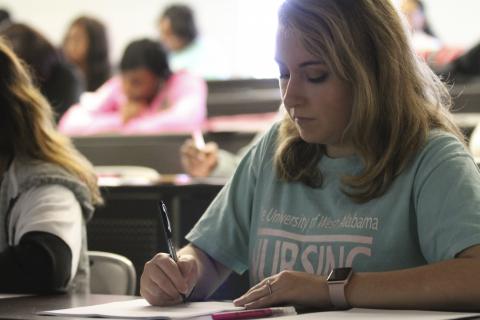UWA receives $2.4 million HRSA grant for nursing scholarships

Project EARN scholarships will benefit 50 students each semester for 5 years
The University of West Alabama has been awarded a $2.4 million grant from Health Resources & Services Administration (HRSA) to provide nursing student scholarships over the next five years. Project EARN will provide scholarships for up to 50 qualifying students in the Ira D. Pruitt Division of Nursing each semester, with $3,000 awarded up to four semesters.
Project EARN—Educating Alabama Rural Nurses—will serve a broad range of students who come from either economically or educationally disadvantaged backgrounds. First generation college students will qualify, as well as students who attended high schools with a majority of students who receive free or reduced lunch.
Scholarships will be awarded for the spring 2021 semester, which begins in January. To be eligible, applicants must have met admission requirements including satisfactorily completing UWA 104 Seminar for Nursing. This course is available online this fall and will be complete before the spring 2021 semester begins.
See Admission Requirements for the Associate in Science in Nursing
UWA enrolls sixty students on average into its nursing program each academic year. “The admission process for student nurses is highly competitive,” said Dr. Mary Hanks, Chairperson of the division. “A degree in nursing is highly-sought-after, and demand continues to increase, but so do the academic rigors.”
Hanks explained that oftentimes students meet the academic prerequisite requirements for admission, but she reiterates this does not guarantee success in the nursing curriculum and clinicals. In many cases, she said, students simply do not have ample time to focus on their program because of various demands.
“A lot of our college students need part-time or even full-time jobs alongside their class schedules and obligations, so the work load can quickly become too heavy,” Hanks said. “Nursing students’ schedules, including classes and clinicals, are dependent on more external factors than a typical degree program, so they usually do not have the flexibility they may need to successfully complete the program if they are working extra hours to pay education expenses. We believe that these scholarships will allow students the financial freedom to eliminate, or at least, drastically cut back, time spent working and allow students to focus on being successful in the program.”
UWA’s bachelor of science in nursing (BSN) program is set to launch in January 2021, allowing nurses who have earned an associate’s degree and become registered nurses to continue their academic pursuits. The curriculum is offered online, providing an option for those already working to take courses in a more convenient setting. These include core academic courses that are not required for the associate’s degree. The BSN positions nurses for supervisory positions, higher wages, and additional workplace opportunities.
“We do everything we can to help students reach their goal of becoming a nurse, and part of that includes working to secure funding sources which may be the deciding factor in a student’s decision to pursue a career in nursing,” said Kelly McClure, assistant professor of nursing who pursued the grant with UWA’s Office of Sponsored Programs and Research. “The grant allowed us to highlight the challenges students in rural west Alabama often face when pursuing higher education. Despite identified economic and educational challenges, we believe that students are capable of great academic achievement if given an opportunity and the resources necessary to facilitate their learning efforts. Project EARN will help make a difference in our students’ lives and the lives of those around them, both in their family and our community as a whole.”
UWA is one of only two schools in Alabama to receive the funding from HRSA, an agency of the U.S. Department of Health and Human Services, and the primary federal agency for improving health care to people who are geographically isolated, economically or medically vulnerable.
Project EARN is supported by the Health Resources and Services Administration (HRSA) of the U.S. Department of Health and Human Services (HHS) as part of an award totaling $450,000 with 17 % financed with nongovernmental sources. The contents are those of the author(s) and do not necessarily represent official views of, nor an endorsement, by HRSA, HHS or the U.S. Government.
For more information on Project EARN, contact Kelly McClure, assistant professor of nursing, at kmcclure@uwa.edu or by phone at 205-652-5529.